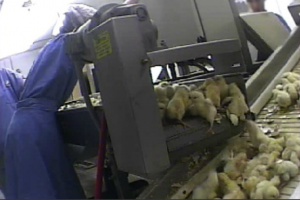Earlier this year, four states were considering “ag gag” bills to criminalize photography, or video or audio recording, of what goes on at factory farms, animal experimentation labs, and other facilities. They all failed, but as I have been saying for months, it will only be a matter of time before these bills are modified and reintroduced.
In Florida, the first has just resurfaced. Senator Jim Norman, who said undercover investigations are “almost like terrorism,” has a new bill. SB 1184 revises a few agriculture statutes that deal with stormwater management, feedstuffs, and citrus harvesting equipment. Then it ends with a transparent attack on the First Amendment.
A person may not knowingly enter upon any nonpublic area of a farm and, without the prior written consent of the farm’s owner or the owner’s authorized representative, operate the audio or video recording function of any device with the intent of recording sound or images of the farm or farm operation.
It makes exemptions for law enforcement and government employees but, of course, there are no exemptions for journalists or activists. That’s the point. Norman filed his original bill at the urging of an egg farmer, Wilton Simpson, who wanted to stop activists from gathering video footage to use in a state ballot initiative against factory farm cruelty (similar to the successful California initiative).
These ag gag bills created quite an uproar when they were introduced. Most people are unaware, though, that dozens of states already have designer laws protecting factory farms from activists.
Florida “Eco-Terrorism” Law Put to Use
Florida already has a law called the Animal Enterprise Protection Act (FL ST § 828.40 – 43). It passed in 1993 at the request of industry, ostensibly to target groups like the Animal Liberation Front who cause “physical disruption” or the loss of property. It has sat on the shelf for years. That is until this month, when an animal rights activist was charged with a felony in what seems to be the very first use of the law.
Chris Lagergren was arrested at gunpoint by an off-duty Miami cop outside of the Marine Mammal Conservancy in Key Largo.
So what was he allegedly doing that prompted an armed cop, 100 miles outside of his jurisdiction, to arrest him at gunpoint? And what was so dangerous that Lagergren’s bond was set at $30,000?
According to the police report, he had been taking photographs and was tampering with a fence:
R. Lingenfelser [the president of the facility] stated he has seen Chris for the past two weeks standing on the Hampton Inn property, video taping the Marine Mammal property and its staff.
Lingenfelser says he saw Lagergren and another individual attempting to dismantle a fence, and called the police. He said the FBI had warned him that Lagergren, a well-known activist in the area, “is going to attempt to release any caged animals [or] mammals into their natural habitat” as part of the Animal Liberation Front, a “domestic terrorist organization.”
This isn’t the first time Lingenfelser has had run-ins with photographers. He previously threatened a photographer with a felony for taking photos of whales.
Lingenfelser may not be a credible source, but as Carlos Miller wrote on the photography site Pixiq: “That’s not to say Lagergren wasn’t trying to free the whales that day… But until they catch him doing something more than just taking photos or trespassing, they should treat him like any other suspect arrested on misdemeanor charges.”
Lagergren is facing up to five years in prison.
Making Bad Laws Even Worse
Many of these original state laws were passed under the auspices on targeting the “radicals,” underground groups like the Animal Liberation Front. It is quite clear, though, that existing laws have already gone too far, and are disproportionately targeting non-violent activists. And while all this is occurring, industry groups are relentlessly pushing to go even further, and transparently target First Amendment activity.
This is the model. This is how corporations and the politicians who represent them are chipping away at constitutional rights. It begins with laws targeting the “terrorists” (who, at the very worst, have damaged property) and then, bit by bit, year by year, the net widens as it wraps up an ever-growing group of people, such as those who photograph facilities that have sent whales to Sea World, and those who expose animal cruelty on factory farms.
Moving forward, people like Senator Norman, the FBI, and industry groups will do everything they can to keep your focus on activists like Mercy for Animals, the Humane Society, and Chris Lagergren. Instead, we need to keep our focus on them, and ask ourselves:
What are they trying to hide?
Want to take action? Sign the petition for Chris Lagergren. And contact Florida senators and urge them to oppose SB 1184.
